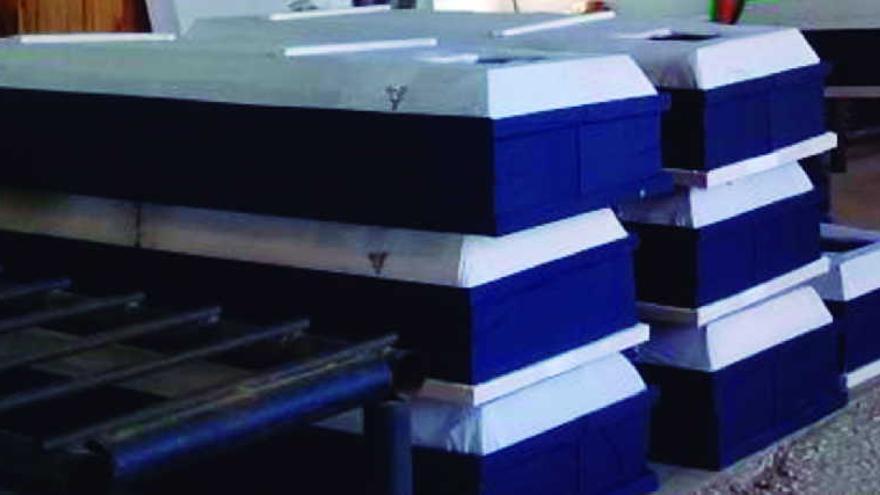
![]() 14ymedio, Havana, 27 June 2023 — Funeral services that have been largely free in Cuba since the 1959 Revolution are beginning to be charged, and others that were already charged will increase in price.
14ymedio, Havana, 27 June 2023 — Funeral services that have been largely free in Cuba since the 1959 Revolution are beginning to be charged, and others that were already charged will increase in price.
In Sancti Spíritus, according to an article published on Tuesday in Escambray, “the structure of Comunales [community services]” is reordered, the agency dedicated so far to these tasks, and a unit of obituary services has been created to “improve the funeral homes and chapels of the province.”
The provincial newspaper offers an interview with the new director of that unit, Yoel Aquiles Martínez, who explains with the usual official jargon, “We have already begun with the monetary reimbursement for the payment of certain activities associated with deaths” due to “the need to free the State from some expenses and to increase the efficiency of certain services.”
So far, the article continues, it has charged for the cremation of corpses and the transfer of the deceased to other provinces, but from now on the transfer of the deceased from one municipality to another within the same province will also be paid, as well as the “vigil at home.”
In this case, “the funeral home provides the services related to the wake, and the family would pay on the basis of the approved price rate.” It is a variant, says Escambray, which “is already applied in the capital of the country” but in Sancti Spíritus “is in the process of approval.”
They will continue at no cost “the delivery of a coffin, the transfer from the house or the hospital to the funeral home or chapel with the provision of the funeral car, the fuel for that activity and the arrangement of the corpse, and within these benefits, those that are related to the wake in the premises enabled as such,” clarifies the newspaper, “but if the family wants another type of service, such as carrying out the burial in another place, outside the municipality or province, then they would be charged for that.”
From the Escambray’s interview, it appears that the State will offer citizens who can afford them “extra” services, such as amphorae for ashes, “other types of coffins of a better design” or “fine flowers.”
“Our purpose is that the obituary services are gradually self-financing, and with that income we can improve those that remain free of charge, including the constructive improvements of the funeral homes and chapels, as well as the technical status of the cars, something that has been worked on, but, due to the degree of deterioration they presented and the long time of usage, it has been impossible to carry out this activity efficiently,” the official acknowledges.
Yoel Aquiles Martínez also says that they have just received two hearses “of Chinese origin,” valued at 1,800,000 pesos each, “and another delivery of this type of transport to the province is expected.”
Faced with the question, which reflects the discomfort of the population due to the frequent delay of the funeral cars, the manager excuses himself by saying that they have “up to two hours to carry out the transfers, but the car can’t arrive until the legal documentation procedure is completed.”
“This is a province with a high degree of population aging,” he continues, “and the number of deaths has increased, to the point that, in recent times, with an average of 200 and more deaths a month, today we are above 400, and usually 50 percent of these happen between Friday and Sunday, which makes the obituary activity in the territory more complex.”
The announcement comes at a time when funeral services have hit rock bottom. The funeral homes have been deteriorating and lack sufficient staff for cleaning. Many times they have a single glass to use during the wake to see the face of the deceased in the coffin, so families must wait for other mourners to finish using it to get one.
The traditional cup of coffee, inherent in Cuban wakes, has also disappeared due to the lack of the product in state funeral homes. Flower wreaths sold to relatives have more tree leaves than flowers and have been smaller and more expensive every year. The amphorae for ashes are crude and fragile.
However, the worst criticisms fall on the coffins or “boxes of the dead,” as they are popularly called. Made of flimsy wood, these coffins lost the metal trim years ago, and the slats have been replaced by strips of wood and cardboard. As a result, it is common to hear that the body of the deceased falls out in the middle of the funeral or during the transfer to the cemetery.
Translated by Regina Anavy
____________
COLLABORATE WITH OUR WORK: The 14ymedio team is committed to practicing serious journalism that reflects Cuba’s reality in all its depth. Thank you for joining us on this long journey. We invite you to continue supporting us by becoming a member of 14ymedio now. Together we can continue transforming journalism in Cuba.
